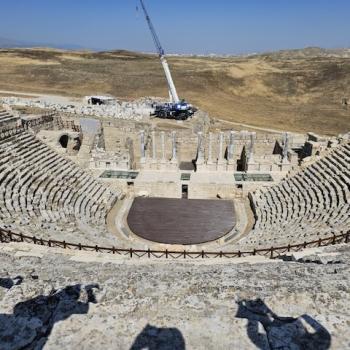 I am very pleased to present the following interview, as a harbinger of the publication of N.T. Wright’s new book, The Kingdom New Testament, (Harper One) a fine, fresh translation of the New Testament into contemporary English. I took the picture of Tom in his study at Bishop Auckland Palace writing away several years ago.
I am very pleased to present the following interview, as a harbinger of the publication of N.T. Wright’s new book, The Kingdom New Testament, (Harper One) a fine, fresh translation of the New Testament into contemporary English. I took the picture of Tom in his study at Bishop Auckland Palace writing away several years ago.
———
1) What prompted you to do a fresh translation of the NT?
It came about because of the ‘Everyone’ commentaries (published by SPCK and WJKP and now complete with Revelation due out next month). Originally we discussed whether I should take one of the existing translations and comment on it; but the series is meant to be ‘popular’ in the sense of ‘designed for people who would never normally dare to open a biblical commentary’, and so I did NOT want to have to say ‘what a pity the NRSV doesn’t quite catch the meaning’ or ‘here again the NIV lets us down badly’ or whatever. So . . . I decided to try doing my own translation, so that people could read a fresh version of the passage and then a comment on it without needing to correct or discuss alternative meanings, etc. Then some reviewers of the early volumes said, ‘Why not gather them all together and make a complete NT’, and it seemed a good idea!
2) What would you see as the distinctive features of your translation, or its major contributions to our understanding of the language of the NT?
My model, and one of my lifelong heroes, was and is William Tyndale. Unlike the King James version (which borrowed about 80% from him), he tried to use short, clear words rather than long, Latinate ones. Much of the NT is not ‘high-class literature’, but street-level writing, designed for ‘ordinary folk’. I have tried to reproduce that in good, strong, clear, comprehensible English. In particular — as an example — I have written dialogue the way we now write it, so instead of ‘Jesus answered and said to them’, I have given the opening words of the sentence and then added ‘said Jesus to them’ or whatever. It makes quite a difference in how we read it — particularly how we read it aloud. Another thing is that Greek often uses little words to join sentences and clauses together, whereas English often doesn’t. I have taken the risk of allowing English punctuation, sometimes, to stand in for Greek words where adding an English word would make the sentence stodgy or ponderous.
3) When you did this translation, what sort and level of audience did you keep in view in your mind’s eye?
My aim was always the ‘ordinary reader’ who reads the newspaper and perhaps the occasional novel or biography but perhaps not much else — certainly not academic theology. In my country there are plenty of people who have been faithful churchgoers all their lives but who have never quite plucked up the courage to read right through whole books of the Bible, perhaps because they were given a King James when they were young and found it hard going (especially in Paul!). I would love it if such people were to find out at last what a joy it is to read the whole thing. But I also wanted to make it available to genuine ‘outsiders’…
4) Inevitably, someone will ask— Why do we need another English translation of the NT? How do you respond?
Translation is a never-ending challenge. All languages change; English has changed, and is changing, as rapidly as any and faster than many, as more and more people around the world learn it as their second or third language. So words and sentences that were OK a couple of generations ago may well have changed their nuance or actual meaning. In addition, there are lots of Greek words and expressions which carry a lot of complicated baggage because of their first-century Greek meanings coupled with the echoes they awaken of Old Testament passages in the Septuagint (the ‘Bible’ of the first Christians). Take dikaiosyne: we simply don’t have an English word that will capture all the overtones of Plato’s and Aristotle’s discussions of ‘justice’ PLUS all the overtones of the Old Testament’s vision of God’s steadfast faithfulness and the requirement and/or gift of an answering faithfulness from his people… so there must be many translations, new ones every generation, to go on nudging us towards fresh angles, fresh insights.
5) Was J.B. Phillips one man translation something of an inspiration for this project? What are the difficulties with one person trying to do a translation of the whole NT?
Phillips was in the back of my mind, along with James Moffatt and Ronald Knox, but I deliberately didn’t look at any of them when I was doing my own version. Clearly any single-author translation of the whole NT will have strengths and weaknesses; I sometimes worry about the books I don’t know so well (being a gospels-and-Paul person particularly), and wonder whether I’ve picked up all their meaning; but other times I worry that I have tried to get too much of my own interpretative theories into the gospels and Paul precisely because I know them better! Actually, though this was indeed a one-man job, I want to pay tribute to two people. Professor Nicholas Perrin, now of Wheaton College, was my research assistant when I worked on the early volumes (the four gospels and all of Paul except Romans and the Pastorals), and he gave me a lot of constructive criticism. Then Dr Michael Lakey, now of Cuddesdon College, Oxford, worked right through the whole text in the course of the last ten months of the project and came up with dozens of places where I needed to phrase something a bit differently to bring out the fuller flavour.
6) Where would you position this translation on the spectrum of more literal or more idiomatic and paraphrastic translations?
It is a translation, not a paraphrase. Yes, there are elements of paraphrase — when I have Matthew say that Peter ‘went out and cried like a baby’ there isn’t a ‘baby’ in Matthew’s Greek, but the alternative (‘bitterly’) has become, in my judgment, a bit flat. I wanted the reader to experience the same meaning that Matthew’s reader would, and that was my (admittedly risky) way of aiming at that goal. But mostly I have stuck very close to the actual word-by-word text, though as all translators know (from any language to any other language — even, dare I say, from English to American!) there are many times when in order to say the same thing you simply can’t go word by word. It’s an art, not a science, but within that art I have done my best to keep it as the art of translation not of paraphrase.
That’s All,
**Thanks! Warm greetings to all the many readers of your excellent blog… Tom
Ben












